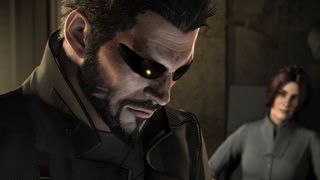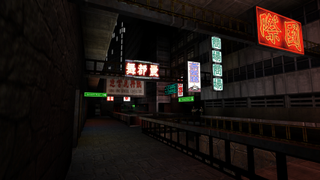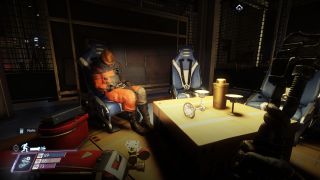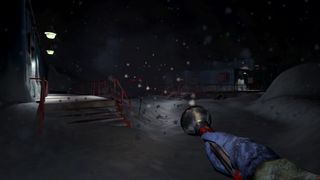The uncertain future of games like Deus Ex and Dishonored
Immersive sims have been held up as the pinnacle of PC game design, but falling sales may mean the genre is endangered.

Warren Spector is stuck in Prey. The director of Deus Ex, who has worked on many games since labeled "immersive sims"—in fact, he coined the term in a post-mortem of Deus Ex—has been playing the modern games inspired by classics like Thief and System Shock. But he hasn't finished Prey yet. Because, as he puts it, "The crew quarters are kicking my butt."
He's enjoying it though, just as he enjoyed the other recent immersive sim from Arkane Studios, Dishonored 2. "I thought they were both excellent examples of what I think of when I say 'immersive sim,'" Spector says. "They removed barriers to belief that I was in another world and they let me approach problems as problems, rather than as puzzles. I'm really glad Arkane exists and that they're so committed to the genre. Without them I'd have fewer games to play!"
Spector's not the only one who'd mourn their loss. There's a feeling in the air that maybe there's reason to worry. Not about Arkane, necessarily, but the immersive sim in general, this genre held up as the shining example of PC gaming at its most smartest and most complex. None of the last three big-budget immersive sims—Prey, Dishonored 2, and Eidos Montreal's Deus Ex: Mankind Divided—have broken a million sales on Steam.
It's always been a niche genre, defined by player freedom, environmental storytelling, and a lot of reading diary entries. How long can these niche games be propped up by the fact that some designers really like making them?

Don't call it a comeback
In the 1990s and early 2000s immersive sims seemed like the future, an obvious extension of what 3D spaces and believable physics and improved AI could do when working together. But they rarely sold well. When Ion Storm’s third Thief and second Deus Ex game flopped, the studio closed. Looking Glass Studios, responsible for System Shock, Ultima Underworld, and the first two Thief games, was already gone. The immersive sim went into hibernation for years.
Despite the love and praise for games like Deus Ex, they're not easy to sell to players. Jean-François Dugas, executive director of the Deus Ex franchise at its current owners Eidos Montreal, says it can be tough convincing people to even make games that let players deviate from the critical path.
"You need to realize and accept that you will build a ton of material that a good part of your audience will miss," he says. "Since you are building possibilities through game mechanics and narrative scenarios, you know that you might not be able to bring all the pieces to the quality level you would like. You have to rely on the effect of the sum of the parts to transcend it all. The GTA series is a great example of that. When you look at all the pieces individually, they’re not the best in class but what they offer their audience when combined is unparalleled. After that, there is a big effort required to convince your team and upper management that spending money on things that many players will not see is a good idea," he says with a laugh.
The biggest gaming news, reviews and hardware deals
Keep up to date with the most important stories and the best deals, as picked by the PC Gamer team.

Spector disagrees with the notion that immersive sims are harder to convince publishers on. "Honestly, I haven't really noticed any particular challenge. It's not like you go into a pitch throwing around geeky genre identifiers. The reality is that immersive sims are action games, first and foremost and most people get that. It's just that the player gets to decide what sort of action he or she engages in and when to do so. Selling action games isn't that tough. Well, at least it's no tougher than selling any other game idea—they're all tough to sell!"
There is a big effort required to convince your team and upper management that spending money on things that many players will not see is a good idea.
Jean-François Dugas
After Looking Glass and Ion Storm's closure the influence of immersive sims was still felt, as people who'd worked on those games brought similar ideas to Oblivion, Fallout 3, and BioShock. The immersive sim philosophy survived in STALKER, Pathologic, and the early projects of Arkane Studios: Arx Fatalis and Dark Messiah of Might & Magic.
And then in 2011 Eidos Montreal's prequel Deus Ex: Human Revolution came along, a true immersive sim and one with the Deus Ex name stamped across it. It sold 2.18 million copies in just over a month. The year after that Arkane teamed with Bethesda to bring out Dishonored, a game in the lineage of Thief which enjoyed "the biggest launch for new IP" of the year. Sequels to both followed, as well as Prey, Arkane's spiritual successor to System Shock. The immersive sim was back.
And yet in 2016, Mankind Divided's launch sales were significantly lower than Human Revolution's. In response the series has seemingly been put on hold, though a publicist told me Eidos Montreal are "not quite ready" to answer questions on why it appears to have failed, or whether there will ever be another full-size Deus Ex.

There are plenty of potential reasons why Deus Ex: Mankind Divided sold disappointingly. It launched a long five years after its predecessor. Its microtransactions and pre-order model were unpopular, and though reviews were positive, most noted that it felt shorter and had an even less satisfying ending than Human Revolution. And yet, though they lacked those specific problems, neither of Arkane's immersive sims was a smash hit either. Perhaps Dishonored 2's launch issues on PC hurt sales, though the history of video games is full of rocky launches that sold like gangbusters. (As I write this, Car Mechanic Simulator 2018 is still in Steam's top 25 in spite of its bugginess.)
Even in their heyday all it took was two commercial failures, Deus Ex: Invisible War and Thief: Deadly Shadows, for immersive sims to go out of fashion for years. Are we about to see that happen again?
If the future isn't bright, why is Adam Jensen wearing shades?
Human Revolution and Dishonored both seemed to find an audience beyond traditional immersive sim fans, beyond the people who know to try 0451 in every combination lock just in case. Their success encouraged Eidos Montreal and Arkane to go ahead with big-budget follow-ups, but of course games cost a lot to make, both in terms of time and money, and need to justify that with strong sales.
Spector says, "it's clear that there hasn't been a huge immersive sim hit on par with some of the other video games out there. I mean, we're still waiting for the game that sells a gazillion copies! I think part of the reason for that is that immersive sims require—or at least encourage—people to think before they act. They tend not to be games where you just move forward like a shark and inevitably succeed. In the best immersive sims, you have to assess the situation you're in, make a plan and then execute that plan, dealing with any consequences that follow. That's asking a lot of players who basically have to do that every moment of their waking lives—in the real world, I mean."
Dishonored 2 applies the immersive sim's freeform gameplay to combat like nothing before it.
It wasn't just immersive sims that didn't sell as well as expected in 2016, however. Titanfall 2, Street Fighter V, and Watch Dogs 2 also struggled for their own reasons—while big, acclaimed games like Overwatch and Battlefield 1 dominated. Dugas says that "your product needs to be more than 'GOOD' today to be successful—whether you are making a movie or a game. People have options and last time I checked there are only 24 hours in a day. If you are not good enough, your audience has gone somewhere else. Bottom line: I believe that if we make outstanding games, no matter what type of genre it is in, people will be there, whether it’s an immersive sim or not."
It's clear that there hasn't been a huge immersive sim hit on par with some of the other video games out there. I mean, we're still waiting for the game that sells a gazillion copies!
Warren Spector
Jordan Thomas, who worked on Thief: Deadly Shadows and all three BioShocks before going indie with The Magic Circle, puts it this way. "Are immersive sims suffering specifically in the market or is everybody? I lean more towards the latter. I think the games space is experiencing a new boom and the simpler your concept is to communicate the more likely you are to find your demographic quickly because they're seeing hundreds and hundreds of concepts at a time. I think that immersive sims traditionally have struggled a little bit with helping people to understand what they're about because they're about many things. They're about a feeling, a cross-section of ideas, whereas a game that is like, 'No, this is just, to quote Garth Marenghi, balls-to-the-wall horror,' it's easier for people to wrap their heads around from a marketing perspective."
Making games like these is expensive, too. "Looking at something like Prey," Thomas continues, "everything is just sparkling. The sheer amount of salesmanship that can go into all of the different reactions that the player can concoct with their chemistry set—literally, in that game, but you know what I mean. The idea of objects being combined to some clever result, every single inch of it shines."

As an indie developer, that level of detail and scope is simply out of reach. "I do think that most indie games that would self-accept the label immersive sim have to compromise because the games that typically are associated with this subgenre were kitchen-sink games."
Perhaps immersive sims are just a particularly tough sell in a crowded market. The next ones on the horizon—a Dishonored 2 expandalone, a spiritual sequel to Ultima Underworld, and both a new System Shock and a remake of the original—might face the same problem. They all have something else in common, though. They're all tied directly to existing immersive sims, whether directly or spiritually. None of them are brand new ideas.

Earlier this year we talked with the designers of Deus Ex, Dishonored, Prey, and Tacoma about their chosen genre. You can read or listen to our conversation here.
It's said that though few people saw the Velvet Underground live, everyone who did seems to have formed a band of their own. The original Deus Ex sold 500,000 copies, a decent amount at the time, and it can seem like practically everyone who bought a copy became a game designer (or at least a games journalist). Its influence is unavoidable, as is System Shock's. That's not to say their influence makes for bad games. Prey is the best thing I've played this year, even though it's essentially System Shock 2 with zero-gravity bits. But there's perhaps a limit to the number of spiritual sequels to the same games we really need. If poor sales motivate future immersive sims to move further from their roots, to try out new settings and inspirations, that might be a silver lining to their current troubles.
Hope comes in the shapes of games that incorporate some of the core elements of immersive sims without being kitchen sinks. Thomas gives the example of Near Death, a survival game set on an Antarctic research base.
"Near Death is made by folks who worked on assorted BioShocks and Deus Exes," he says, "but it is not oriented towards combat whatsoever. It is set in a world with no magic, just you versus an environment which, arguably, is one of the callsigns you might associate with immersive sims." It's another game that presents problems rather than puzzles, in "a fully realized environment that has rules that you must learn in order to eke out an existence. It is that concept writ large. You are trying not to freeze to death and you are using your wits to combine systemic objects in the environment based on some amount of real-world common sense."

It may not seem like it when you're punching a tree to collect wood for the hundredth time, but according to Thomas there's a direct connection between survival games and immersive sims.
I honestly feel like a lot of the people who are building these ultra-successful early access survival games are influenced by immersive sim design. That notion of systems alchemy is at the core of that.
Jordan Thomas
"I honestly feel like a lot of the people who are building these ultra-successful early access survival games are influenced by immersive sim design. That notion of systems alchemy is at the core of that. When the trend caught on it felt fresh, right? It felt liberated from some of the rhetoric associated with immersive sims and very seldom about story at all. It's if you took the parts of the genre that we used to say we loved, which were that all of the rules of the game could be atomized and combined into new molecules—that's what we told ourselves as developers of these things. 'This is a real place, man! With a sort of mathematics that you can learn to speak and you're gonna express your mastery through doing that!' But survival games are that crystallized and they let go of a lot of the high-minded philosophy and let atavism rule."
Survival games aren't the only place the influence of immersive sims is felt. New open-world RPGs and sandbox games are all obliged to emphasize player choice. Horror games like Alien: Isolation and Resident Evil 7 borrow directly from the immersive sim playbook right down to the environmental storytelling through graffiti, and stealth games like Hitman with creative paths to murder can evoke the same feeling. Indie games like Consortium, The Magic Circle, and even Spider: Rite of the Shrouded Moon each take aspects of the immersive sim and expand on them, and so do walking simulators. Both Gone Home and Tacoma take the bit of Thief where you rummage through someone's belongings and read their diary, building up an idea of who they are, and make that the entire game. Tacoma is even set on an abandoned space station, possibly the most immersive sim location imaginable.
If immersive sims become too commercially risky for the current climate, and if they go into hibernation for another decade, they won't really be gone. Thanks to the spread of their concepts throughout games they can't really go anywhere—because they're already everywhere.

Jody's first computer was a Commodore 64, so he remembers having to use a code wheel to play Pool of Radiance. A former music journalist who interviewed everyone from Giorgio Moroder to Trent Reznor, Jody also co-hosted Australia's first radio show about videogames, Zed Games. He's written for Rock Paper Shotgun, The Big Issue, GamesRadar, Zam, Glixel, Five Out of Ten Magazine, and Playboy.com, whose cheques with the bunny logo made for fun conversations at the bank. Jody's first article for PC Gamer was about the audio of Alien Isolation, published in 2015, and since then he's written about why Silent Hill belongs on PC, why Recettear: An Item Shop's Tale is the best fantasy shopkeeper tycoon game, and how weird Lost Ark can get. Jody edited PC Gamer Indie from 2017 to 2018, and he eventually lived up to his promise to play every Warhammer videogame.

Path of Exile 2 numberlord spends 16 straight days killing rare monsters to prove that a stat that makes loot better makes better loot

A tabletop RPG designer made a game about the way FromSoft NPCs say cryptic stuff and go 'heh heh heh' all the time, and the result is a love letter to the 'grubby little weirdos'
Most Popular



